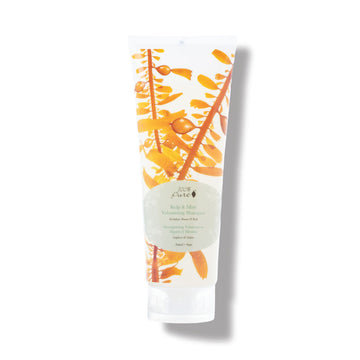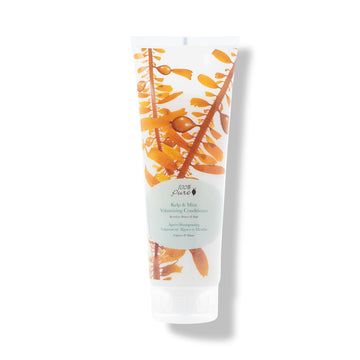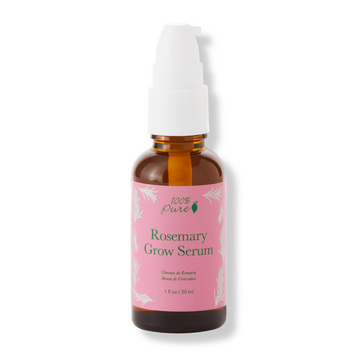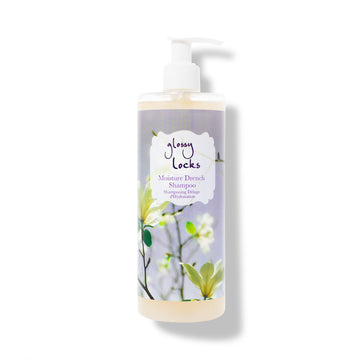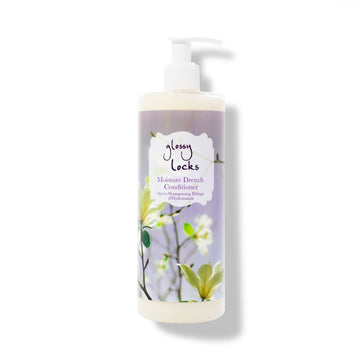Solutions for Smoke, Pollution, and Daily Damage
Posted on May 20, 2024 Written by: 100% PURE ®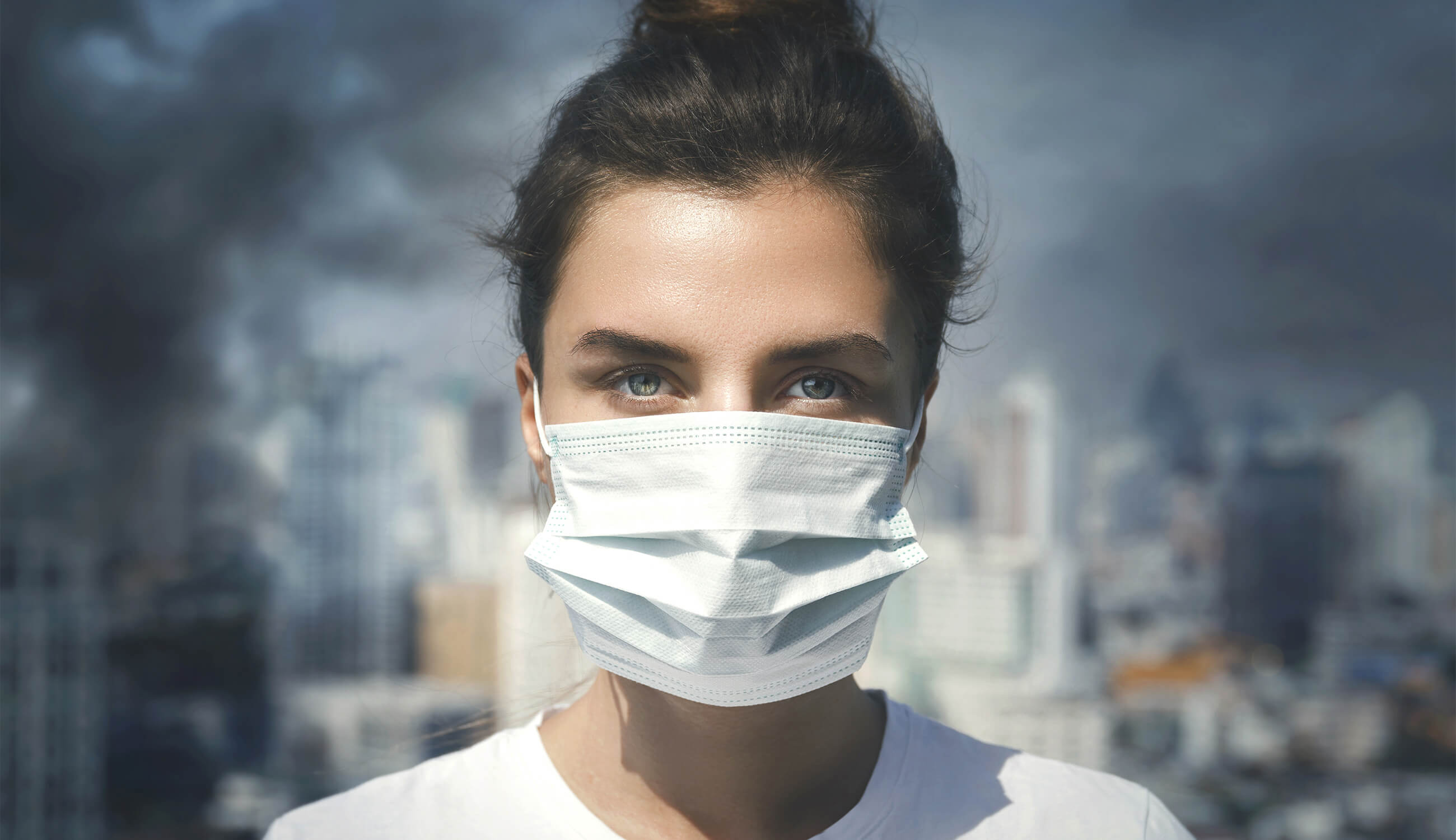
We often obsess over protecting our skin from air pollution and free radical damage. Unfortunately, pollution, from smoke to environmental irritants, can wreak havoc on your hair, too – and it may be a bigger problem than we thought.
So how does pollution damage hair, and more importantly, how can we stop the cycle? Read on to find out how you can protect your strands from the haunting environmental pollutants – plus the best anti-pollution hair care products to combat these faceless phantoms!
We’re exposed to environmental pollutants every day. They’re dispersed into the air through car exhaust, smoke, and dust. These particulates can be especially difficult to purge from the hair and tend to stick around until we shampoo or clarify the hair.
The same UV rays responsible for aging the skin are also a major factor in damaged hair. Just like skin can get burned and rapidly age when exposed to the sun, hair can also take a beating in the form of scalp dryness, moisture loss, and breakage.
While many of us are spending more time outdoors during the summertime, the pollutants and UV rays we’re exposed to can quickly accumulate and affect our strands. This can lead to:
-
Scalp inflammation: increased itching, redness, irritation
-
Hair that feels brittle to the touch
-
Hair breakage
-
Hair loss
While this news may tempt you to lock yourself indoors, there are ways around hair damage from pollution. But first, let’s take a quick look at how hair damage prevention can vary by hair type.
Hair is unique to each person, and all hair types need their own version of attention and care. But can pollution affect different hair types in different ways?
A 2019 Brazilian study published in Scientific Reports measured how environmental damage affected different hair types: natural, colored, bleached/colored, and gray hair. Swatches of hair were attached to cyclists’ helmets as they rode around Rio de Janeiro for 6 hours, exposed to extreme heat and climate conditions.
The answer: every hair sample was damaged during exposure. However, natural hair experienced the least amount of damage while colored, bleached, and gray hair samples all experienced heavy damage.
The study found that air pollution, photo-oxidation, temperature, and sun exposure were all contributing factors to hair damage. They affected the protein content, melanin oxidation, and structural quality of the hair. This means all hair types may experience weaker strands, discoloration, and loss of softness after prolonged exposure to environmental pollution.
That being said, it’s always helpful to know how to care for your hair based on its natural texture. Here are a few baseline tips for preventing damaged hair – pollution or no pollution – in the 4 main hair types: straight, wavy, curly, and kinky.
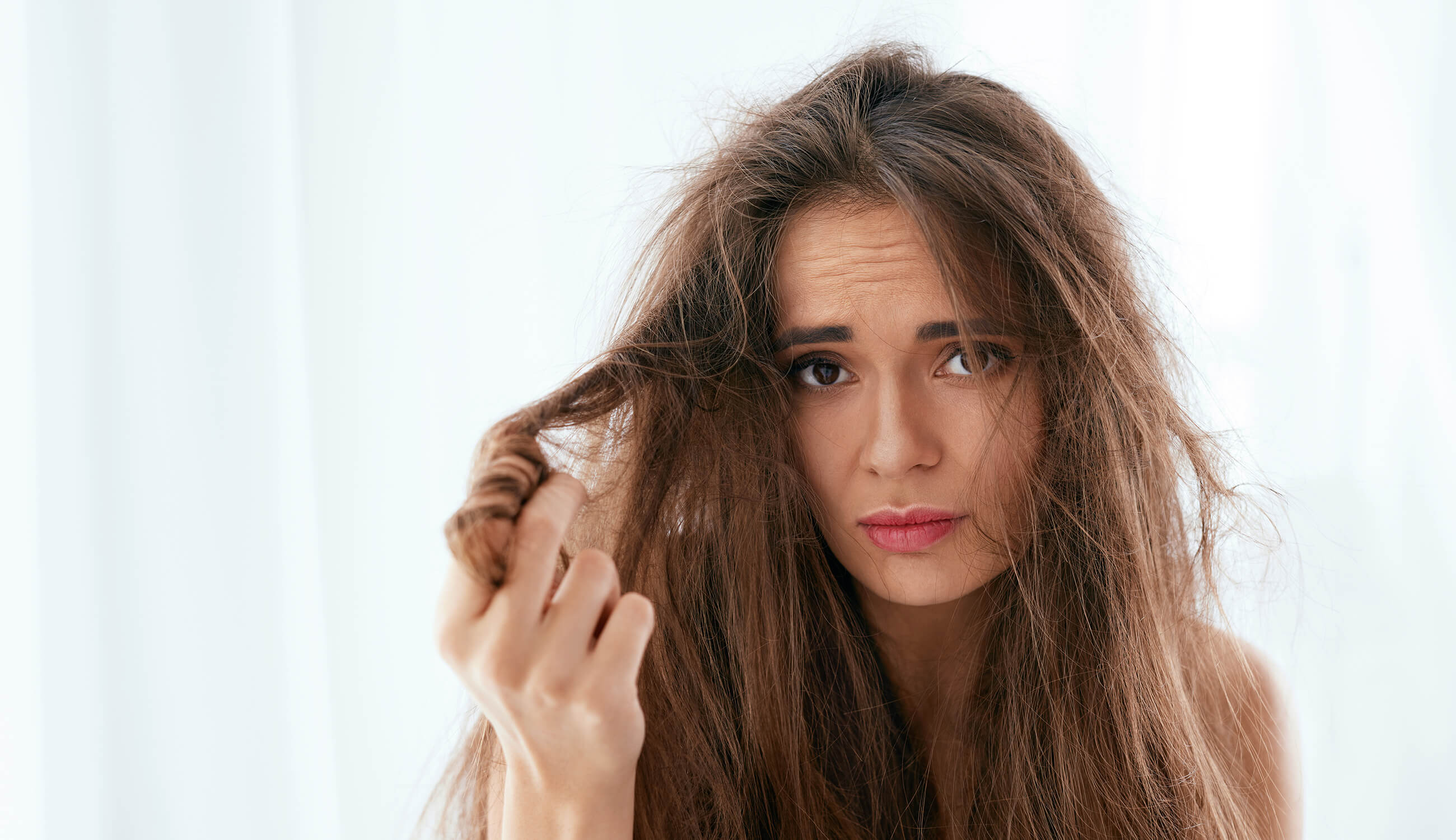
Straight Hair
Straight hair can vary widely in thickness, but its most distinctive feature is that it holds no natural curl. Since straight hair tends to generate more oil, a powder-based dry shampoo can work wonders for absorbing oil without dehydrating the scalp.
On the damage-control front, make sure not to wash straight hair too often. An oily scalp will notice when it’s been stripped of its natural lipids and will overproduce oil to make up the difference. You’ll be left with long, heavy hair that’s weighed down with oil – in terms of pollution, particulates in the air will stick much more easily to greasy hair.
Wavy
Wavy hair doesn’t quite hold a curl, but flaunts a lovely S-shape curve in its strands. These waves can enjoy significant definition when styled with a gel or mousse, but make sure to avoid cream products.
While those with wavy hair may use more product than other hair types to achieve definition, beware of product buildup on the scalp. Wavy hair types may also be overzealous with hot hair tools, tempting to straighten those ‘S’ curves. If you have color-treated hair – or hair that’s over-exposed to the elements – constant hot tool use could be what’s tipping dryness and hair damage over the edge.
Curly
Those with curly hair tend to have an especially hard time without products to tame their tresses. Avoid curl products that contain silicone or sulfates, which can contribute to damaged hair on a long-term basis.
The build-up of air pollutants on the scalp can lead to follicle damage, which can contribute to dandruff, hair loss, and scalp irritation, not to mention especially unruly curly hair. Curly types should also heed the warning above about hot hair tools – especially if your hair is suffering from signs of environmental damage.
Kinky
Individuals with kinky hair should avoid over-brushing, as this can result in further breakage of already damaged hair. Instead, we recommend following up your shower with a leave-in conditioner combed through the hair with fingertips and allow strands to air-dry.
While these quick hair-care tips are a start, you might be wondering: is there truly a way to target pollutants in our hair care? Actually - yes! We’re starting to see an increase in products created specifically for detoxing the scalp and shielding strands from UV exposure.
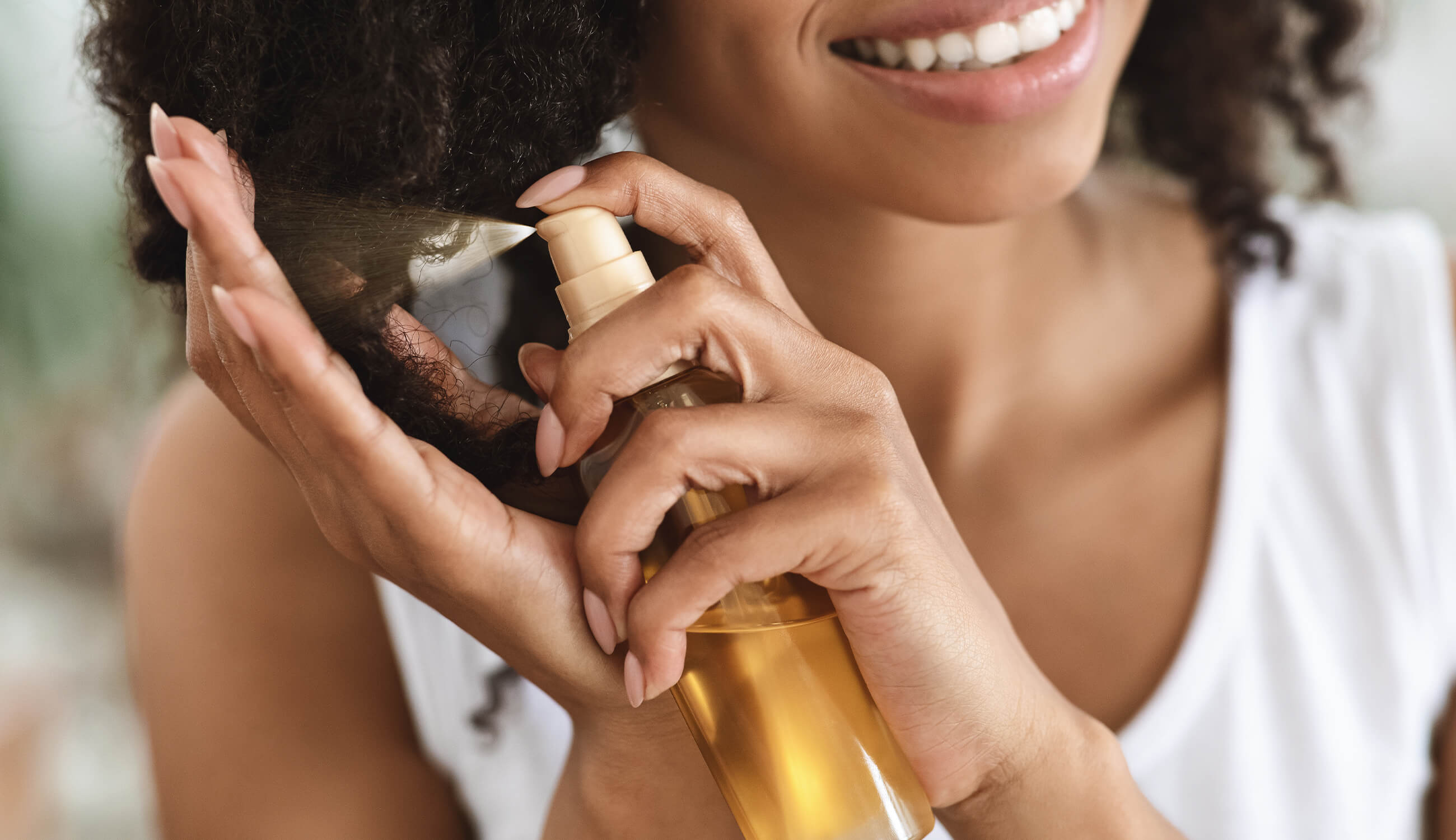
Before you spend money on your next anti-pollution hair treatment: you may already have one of the most effective ones in your home! A hat or scarf may seem like old-school accessories, but they’re a great way to protect your hair from the elements. This includes smoke, grime, dust, and UV rays.
Looking for a new head scarf to protect your hair? We encourage you to purchase with purpose whenever you can! That’s why we recommend checking out RefuSHE, a nonprofit dedicated to building a community for female refugees in Kenya and their home countries. They sell hand-dyed, one-of-a-kind scarves in an array of gorgeous prints and colors.
100% of the proceeds go back to the Artisan’s Collective and its members, ensuring that the women behind these pieces are rightfully recognized and compensated. It’s a little scarf whose huge positive impact goes a long way!
Now that we know how pollution can damage your hair – plus how these faceless phantoms can harm different hair types - let’s talk about the top anti-pollution hair care products that can transform your locks from dull and damaged to healthy and happy!
Kelp and Mint Volumizing Shampoo and Conditioner:
Experience a gentle purifying and invigorating hair wash with our specially formulated Sea Kelp and Mint Shampoo and Conditioner. Expertly crafted with powerful ingredients that promote bounce, body, and luster, our sulfate-free formulas revive and strengthen hair with the goodness of sea kelp, French sea salt, seaweed collagen, aloe, and rose hydrosol.
Delicately cleansed with saponified coconut oil, this cleansing duo is gentle enough for color-treated hair and ensures unparalleled shine, texture, and moisture replenishment to even the most damaged of locks.
Rosemary Grow Serum:
It’s no secret that different hair types require different hair treatments, but all scalps benefit from some stimulation. And our favorite ingredient for promoting hair growth is rosemary oil. This essential oil is rich in antioxidants and anti-inflammatory properties that can help stimulate hair growth by improving blood circulation in the scalp, promoting nutrient delivery to hair follicles, and strengthening hair strands. This is a definite go-to anti-pollution hair care serum!
Pro-Vitamin B5 Smoothing Hair Serum:
If you feel like most hair serums feel heavy in your hair, our Pro-Vitamin B5 Smoothing Hair Serum may be more your speed. This buildable, lightweight hair serum helps to reduce split ends while promoting hair’s natural shine and gloss.
Our signature serum formula replenishes damaged hair with vitamin E, to seal in moisture without creating the greasy feeling left by silicone-based hair serums. Lavender essential oil offers antibacterial properties to calm and neutralize irritation in the scalp. This is our go-to rehab treatment for stressed, damaged hair at the end of a long week!
Glossy Locks Moisture Drench Shampoo and Glossy Locks Moisture Drench Conditioner:
This deeply moisturizing shampoo and conditioner gently cleanses while restoring essential nutrients and hydration to dry, damaged hair. This nourishing duo is made with supremely hydrating aloe vera, rose hydrosol, and cucumber to quench thirsty strands. Coconut oil and seaweed collagen lock in essential moisture to restore healthy bounce and shine.
This natural shampoo and conditioner formula also includes horsetail plant to restore hair strength, and nourishing biotin to support healthy growth and volume. This sulfate-free shampoo and conditioner are safe and gentle enough for color-treated hair..
Over the years, an increase in environmental pollution has had major effects on not only the skin but also our hair! What our strands need is a consistent, proactive defense against air pollution and UV rays year-round because the effects of pollutant and free radical damage are year-round “real” phantoms.
What’s best for our hair is to supplement natural hair care formulas with antioxidants and UV protectants that fight oxidative and environmental stress and contribute to balanced locks overall. Luckily, there are natural anti-pollution hair products that can help ward off the effects of air pollution and restore your strands to luscious locks!
How does pollution affect different hair types?
Pollution can affect hair in different ways depending on the type of hair. For example, hair that's exposed to higher levels of pollutants can have damage to its proteins, which can lead to breakage, brittleness, and dryness. This damage can also weaken hair strands and disrupt the hair growth cycle, which can lead to hair loss and the structural quality of the hair. This means all hair types may experience weaker strands, discoloration, and loss of softness after prolonged exposure to environmental pollution.
What are the signs of hair damage caused by pollution?
Hair damage from pollution includes split ends, dry hair, breakage, dullness, discoloration, and frizziness. This damage can result in strands looking damaged, brittle, or straw-like in texture, weakened hair strands, and overall dryness.
How can I protect my hair from pollution and environmental damage?
Opt for restoring and nourishing hair products to help combat pollution and environmental damage. Great anti-pollution hair care options include hydrating toners, moisturizers, hair serums, masks, and treatment oils. These products can revitalize hair and improve its ability to defend against external environmental aggressors and UV rays.
What are the best products for detoxing hair and scalp from pollutants?
Opt for natural hair detoxing and clarifying hair formulas. Hair detoxing is like pressing the reset button on our hair and scalp. It strips off any pollutants and creates the shine and volume you’ve come to love with fresh hair! Clarifying is key to keeping your crowning glory looking good and feeling strong, all while promoting healthy growth.
Is it necessary to use all five methods to see results?
While using a combination of methods can potentially yield more significant results, it's not always necessary to incorporate all five collagen-boosting strategies to see improvements. Start by focusing on one or two approaches that align with your lifestyle and skincare goals. Consistency is key, so stick with your chosen methods over time to maximize their effectiveness. Additionally, maintaining a balanced diet, staying hydrated, protecting your skin from sun damage, and avoiding habits like smoking can also contribute to collagen production.
If you choose to clarify your hair, deep conditioning afterward will be very important. If you don’t replenish with enough moisture, the scalp goes into oil production overload, undoing everything you’re trying to combat. Applying a leave-in conditioner or hair serum while the hair is damp helps trap moisture in the strands for soft, hydrated locks.
Can UV rays contribute to hair damage and how can I protect my hair from them?
Yes, exposure to UV rays can contribute to hair damage. Dryness, reduced strength, rough surface texture, loss of color, decreased luster, stiffness, and brittleness of hair are caused by sun exposure.
To help protect your locks, wear a hat with UPF: Wearing hats with Ultraviolet Protection Factor (UPF) can help to block a significant amount of UV radiation, safeguarding your hair and scalp. Avoid harsh chemicals: Avoid using hair products containing sulfates, parabens, and silicones.
- Tags: Bath & Hair, Hair, Hair Care, May-2024
We carefully hand-select products based on strict purity standards, and only recommend products we feel meet this criteria. 100% PURE™ may earn a small commission for products purchased through affiliate links.
The information in this article is for educational use, and not intended to substitute professional medical advice, diagnosis, or treatment and should not be used as such.





